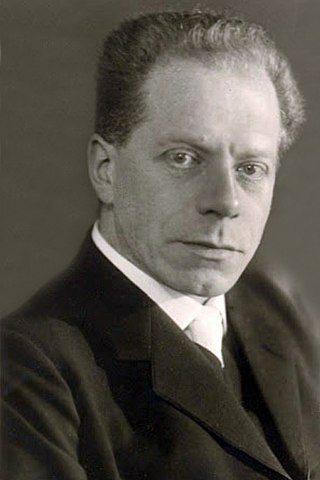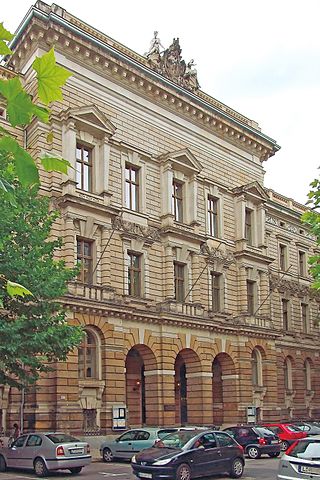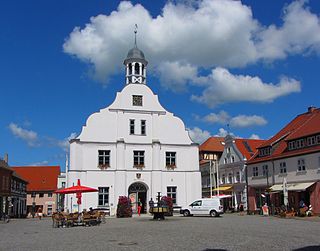Related Research Articles

Leonard Nelson, sometimes spelt Leonhard, was a German mathematician, critical philosopher, and socialist. He was part of the neo-Friesian school of neo-Kantianism and a friend of the mathematician David Hilbert. He devised the Grelling–Nelson paradox in 1908 and the related idea of autological words with Kurt Grelling.

The University of Music and Theatre "Felix Mendelssohn Bartholdy" Leipzig is a public university in Leipzig, Saxony, Germany. Founded in 1843 by Felix Mendelssohn as the Conservatorium der Musik, it is the oldest university school of music in Germany.

Wolgast is a town in the district of Vorpommern-Greifswald, in Mecklenburg-Vorpommern, Germany. It is situated on the bank of the river Peenestrom, vis-a-vis the island of Usedom on the Baltic coast that can be accessed by road and railway via a movable bascule bridge. In December 2004, the town had a population of 12,725.

The Order of the Black Eagle was the highest order of chivalry in the Kingdom of Prussia. The order was founded on 17 January 1701 by Elector Friedrich III of Brandenburg. In his Dutch exile after World War I, deposed Emperor Wilhelm II continued to award the order to his family. He made his second wife, Princess Hermine Reuss of Greiz, a Lady in the Order of the Black Eagle.

Heinrich Ferdinand Adolph Schönfelder (1875–1966) was a German politician, Alterspräsident of the Federal German parliamentary council in 1948–49, mayor of Hamburg, and member of the Hamburg Parliament. Schönfelder was member of the Social Democratic Party.

The International Federation of Chemical, Energy and General Workers' Unions (ICEF) was a global union federation of trade unions.
The International Union of Hatters was a global union federation of trade unions representing people involved in making hats.
The International Union of Woodworkers (IUW) was a global union federation bringing together unions representing wood carvers, carpenters and joiners.
The International Federation of Building Workers (IFBW) was a global union federation bringing together unions representing masons.
The International Union of Hairdressers was a global union federation bringing together trade unions representing hairdressers.
The Central Union of Carpenters and Kindred Trades of Germany was a trade union representing carpenters in Germany.
The International Union of Leather Workers was a global union federation representing tanners and glovemakers.

The General Union of Public Sector and Transport Workers was a trade union representing workers in various industries in Germany.
The Central Union of Bakers and Confectioners was a trade union that played a significant role in representing workers in bakeries and related trades in Germany.
The Central Union of Butchers and Kindred Trades of Germany was a trade union representing butchers and abattoir workers in Germany.
The Union of Coopers, Cellar Managers, and Helpers in Germany was a trade union representing coopers and those in related trades, in Germany.

The German Furriers' Union was a trade union representing fur workers in Germany.
The Union of Stone Setters, Pavers and Kindred Trades was a trade union representing paviours and people in related trades, in Germany.
The International Artists' Lodge is a trade union section and former independent trade union, representing variety and circus performers in Germany.

The Central Union of Employees was a trade union representing white collar, private sector workers in Germany.
References
- ↑ "Erste Internationale Konferenz der Zimmerer-Organisation" (PDF). Der Zimmerer. 15 (19): 158–159. 9 May 1903. Retrieved 17 June 2020.
- ↑ The American Labor Yearbook. New York: Rand School of Social Science. 1924. p. 263.
- ↑ Rütters, Peter; Zimmerman, Rüdiger. "Bauarbeitergewerkschaften in Deutschland und Internationale Vereinigungen von Bauarbeiterverbänden (1869 – 2004)" (PDF). Friedrich Ebert Stiftung. Retrieved 29 May 2020.
- ↑ Wolgast, Wilhelm (1931). Zentralverband der Zimmerer und verwandter Berufsgenossen. ADGB. pp. 2111–2112. Retrieved 29 May 2020.
- ↑ "Internationale Bauarbeiterbewegung" (PDF). Der Grundstein. 37 (52): 1. 27 December 1924. Retrieved 9 June 2020.